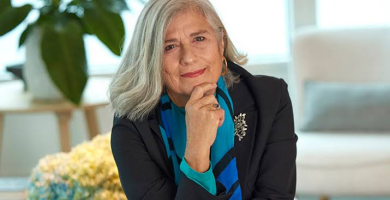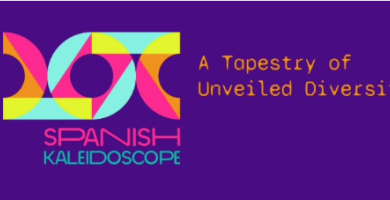
Núria Campabadal: "Editing is a trade and you learn by editing; the only path to learning is through practice."
This month we interview Núria Campabadal, audiovisual editor. We talk to her about the job of editing in the world of audiovisual. Núria has participated in our Filmmaking occupations talks with Dones Visuals within Pantalla Barcelona.

For someone who doesn’t know what your job consists of, what does a film editor do? What magic does editing contribute to a film?
Editing is the great unknown of film jobs, although it is the most intrinsically cinematographic part since, unlike all the others (directing, photography, screenplay, acting, music, etc.), it is the only one which originates with films and did not exist before. It does not help that in the beginning it was considered to be a purely technical trade and that no creative element was attributed to it (unfortunately this belief still exists today, as it continues to be considered a technical and not an artistic job). However, right at the beginning of films, some filmmakers began to see the narrative possibilities of intercalating, for example, two actions which occur in two different spaces, or different film planes to dramatically strengthen one event or another, or how joining two images creates a new meaning which did not exist in either of the original images. In the 1920s, cinematographic language (which is constructed through planning and editing) was already well developed and brought about masterpieces from the history of film.
Nowadays, we could say that the editor joins the planes of the film, but also modifies the time and the space to succeed in arousing the spectators’ emotion and explaining the story well. It is said that the screenplay of a film is written three times: once in the script, again in the shoot, and finally in the editing room. As editors, we are narrators who see the images that have been obtained in the shoot and, starting from that, we work to explain the story in the best possible way. For this, we choose one shot or another, together with the director we choose the best fragments of the actors’ performance, sometimes we eliminate lines of dialogue or even scenes if we believe that they are unnecessary or delay the action; also sometimes we reorder the structure of the film if we believe that this makes it easier to understand the story, or we even add dialogues which will then be recorded separately and which we will edit as if they were part of the original shoot. We also create the rhythm of the story, which is what keeps you stuck to your cinema seat or allows you to experience certain situations with certain characters.
In which part of the production process of a film does the person in charge of the editing appear? Before, during or after the shoot?
We always work starting from the images, so strictly speaking our task would be after the shoot. Having said this, we often edit at the same time as it is shot and sometimes the editors can even suggest planes or sequences to be shot if they see that this will improve the story. Also, the editor often already comes in during the screenplay process and gives their opinion. We are narrators; our job is to make the stories work well, so we provide an expert opinion in this field and we are often asked for it. Other times we only appear after the shooting process. This is the most usual process with documentaries. There are editors who prefer not to read the script and to work just starting from the images. It depends a lot on the project and on the professionals who are working.
What attracted you about editing and made you decide to devote yourself to this? Did you already know when you were studying or was it afterwards when you entered the world of work?
In actual fact, I studied fiction script writing at the ESCAC and I ended up editing documentaries! I have always been greatly attracted by the art of telling stories but, when I was studying, I didn’t pay much attention to editing. Then, professionally, I became very interested in documentaries, and there I performed several tasks on several projects, until I realized that the story was really constructed in the editing room. So I ended up specializing in this. It is not the usual path but I do believe that it was quite natural. Indeed, as editors we are the scriptwriters of the last version of the project (and, in documentaries, almost the first), so it occurred in a very organic manner.
What are the most interesting challenges that you face on editing a film?
Each film is a different challenge. Indeed, at the beginning it always makes me doubt; it is as if you were starting from scratch each time! Sometimes, when talking with other editors, I see that this is a shared feeling. Until you really get into the project, there are a few days of adjusting to it, to the director, the type of narrative, the tone, the specific difficulties of each project...
You have specialized in documentaries. What is it that attracts you to them and what differences do you see when it comes to editing fiction, for example?
I became an editor starting from documentaries. Unlike fiction, with documentaries the script is usually constructed in the editing room and there is not a previous script; it is constructed starting from normally very abundant material in which the possibilities are a priori infinite (there is often more than one possible story in the material that you receive). For me, the big challenge with documentaries is often to find the story and the structure which works the best to explain this story. To create the dramatic arcs of the characters, to find the rhythm, … At the same time, the options that you have to edit a sequence are not as abundant as in fiction: you do not have as many takes or points of view of the same action. Therefore, the work of the documentary editor is often almost one of a gleaner: you view the images and you choose one image from here, a dialogue from there, a gesture by the character, a silence, a look, a camera movement. Starting from this, you build up a sequence; you give it shape to narrate what you want this sequence to say. Then, you gradually construct the story, placing one sequence behind the other, reordering them... Sometimes you construct a sequence starting from fragments shot at very different times and in very different spaces... Or you construct a narrative with a beginning, a middle and an ending starting from hours and hours of interviews. There is a lot of the architect in the work of a documentary editor: you almost create a new structure. With fiction as well, but you already have a previous structure, which is the original script and, starting from that, you modify and rewrite. Indeed, both editing jobs have many things in common, and also many differences.
You have also edited for advertising and television. Is this a completely different world from film editing?
Each type of editing has its specific characteristics and differences in relation to the others. With television, which is where I have worked the most, the editing times are much shorter; you often edit something which is broadcast on the following day or in two days’ time... The rhythms and the organization are therefore very different. Your contribution to the editing is also different; there are places where you are expected to be more a technician who has a machine and others in which you are expected to provide an opinion and to contribute to the narrative... Each project is a world apart, as is each speciality.
In the editing, do you work together with the person who is directing? And what is this process like for you?
In general, you work very closely together; you spend many hours in a room with this person. You obviously have to understand each other, otherwise it can be hell. Normally, when directors enter the editing room, they have already gone through pre-production, shooting... and they are already quite exhausted, and that is where they see what they have done for the first time, and find out about the triumphs and also the mistakes, which there obviously always are; they form part of the process. So our work is often to act as a psychologist, to listen to them, to make them feel confident and appreciated and in an environment in which they can work and try out different things without limitations.
We work together very closely and often, when you have worked for some time with a director, you can almost read their mind; it is quite a curious and fascinating process. Indeed, there are many directors who always work with the same editor, since they are relations which are built up over time and the more time you have worked together the better it is. This is why I say that you can almost read their mind and that you, as an editor, already know what they like and what they don’t, and you work in that direction. You also have to feel at ease with that person, so a non-written part of our job is to create a pleasant working environment.
As editors, in general we are also patient people who are used to offering solutions. Our work is to solve all kinds of (technical, narrative) problems and to succeed in creating the best possible project in the times that we are given (which are sometimes very short). Not long ago we created AMMAC, which is the Association of Audiovisual Editors of Catalonia, in order to disseminate our work and defend our rights, and the truth is that it is an incredible, and also very fun experience to suddenly work with a great deal of editors (when normally we work alone in an editing room), because it is clear that, although each of us is different, we have many things in common. In general, we are practical people, without very big egos (despite the fact that sometimes we do also have a little, eh) and used to giving in and discussing. So it is proving to be quite easy to work together and it is a very enriching and interesting experience on all levels!
You also give storytelling, script writing and editing lessons for young people. What would you advise young people who are studying editing?
To watch a lot of films and to read many books, of all kinds, but also about editing, which do exist! Now, unlike when I was studying, there are also many resources on the Internet, interviews with editors, videos which compare several types of editing... They should soak up everything that they can. It is also very educational to watch films analyzing the structure and the editing. Also, if they have friends or acquaintances with the same interests, they should show them their editing, or go to see viewings of others. This is one of the things that I like the most, to see the editing of other people halfway through and to consider how it can be improved or what things you believe work and what don’t. They should also edit everything that they can. Editing is a trade and you learn by editing; the only path to learning is through practice. You cannot get around the thousands of hours in front of the screen. Obviously, the more you study the greater your audiovisual and general culture will be, and the more tools you will have to be a better editor.
The role of women in audiovisual has been vindicated in recent years. Do you believe that there is already a balance now or are there still more male than female editors?
Editing, on being a technical job (and, therefore, less appreciated than “artistic” jobs like directing or photography) in which also, at the beginning, because of the laboratory work and film handling, there was great demand for small and expert hands, has traditionally been one of the film jobs which it was easier for women to enter. They began by cutting film and, starting from that, they could gradually learn and rise up in the trade. Some of the qualities that an editor is supposed to have (order, patience, ability to organize the material) are also qualities traditionally associated with women and meant that their presence was not frowned upon there. The fact that it is one of the most invisible trades also helped.
With AMMAC, we are trying to establish what percentage of female editors there is. For the moment we see that there are 65% men and 35% women as members, which mustn’t be accurate, but which does reflect the profession a little. We see that other issues, such as a work-life balance, also act as a glass ceiling for many female editing professionals and indeed this prevents them from gaining access to many projects. Many give up. So we are not yet at 50% and there is still a lot of work to do.
What difficulties have you encountered as a woman in your work?
As a woman I have not encountered any specific difficulty once in the editing room. However, when I was much younger, for example, in the technical part you often encountered a man who would kindly explain things that you already knew on a technical level, that is to say that they did mansplaining. Or you find that they make certain comments or little jokes. After all, this is the least that any woman encounters in the world of work. I think that where there is most discrimination, like in so many other jobs, is before you are hired: mainly male teams in which men call other men by default to carry out a task which a woman could also do. Indeed, on most occasions they are not aware of this and they do not see anything strange in the fact that, in an entire post-production team, where there are several editors, coordinators, etc., there are no women, or there is only one. They don’t find it at all strange when, in actual fact, even statistically, it is. There is still a lot of work to do against this.
On a small and personal scale, I have found that many of us as women have decided by default to do exactly the opposite: to always try to call women when they ask you whether you know someone to develop such and such a task, to try to offset this imbalance a little. "Ladies first". There is, however, still a lot of work to do, since the majority of team leaders are men who do the hiring and set up the teams. Work-life balance is another big issue. It is not normal that having children penalizes women much more than men on a work level. And, in general, we need to achieve more human work times which do not go against sustaining life. Here, audiovisual has the same shortcomings as many other professions.
What I do think is important in the audiovisual sector is that it is one of the sectors, maybe the most important on an economic and impact level at the moment, which narrate the world. Therefore, if it does not include the female view, not as a sub-genre but from a position of parity, if it does not explain the world seen by women, stories of women narrated by women, it only explains one vision of the world. That of the heterosexual white cis man, to be more precise. This is a very limited vision and indeed very detrimental to those of us who are not men, not cis, not white and not homosexual. It rejects us as subjects and agents of our own story. And it makes us feel inadequate, because we do not see what happens to us reflected, only what white men think that we are, which is often very far from the truth. That is if we appear at all. That is why it is so important for us as women (and non-white, trans, non-hetero people, etc.) to be able to explain our own stories, and for them to reach everyone with the same opportunities as those narrated by white men. I would also add that we are entitled to work on stories which explain us, or in which we can contribute our outlook, and that this is a task of all departments. It is also important to have women in the editing or in the photography or the sound. Not just for the female “outlook”, but because from a labour point of view we have the same right to work and to have the same opportunities as men. But, as I said, there is still a lot to do!
In your years working as an editor, have you noticed the technological changes a lot on editing and how have they affected your work?
I already began to work with non-linear editing, with a computer. The huge shift came about on going from linear to non-linear editing; the way of working changed a great deal. What I do find is that, cyclically, the programmes change and you have to gradually learn how to use them, and it is true that when you have been working with a programme for a long time it becomes an extension of your body, and it is difficult to change programmes! An editor is also asked to do an increasing number of things: to edit, but also to do the colour, or the graphics, or the post-production of the sound. For me each of these things is a different job, and it is very complicated to do all of them well, although on very small projects you already do it by default... It would appear that everything should be easier with digital, and in part it is, and this has greatly democratized the trade, but it has also led to the belief that a single person can do it - despite the fact that while paying just one person you have the work of four - and this is not the case.
You are also a director. What kind of projects and stories are you interested in explaining as a director and screenwriter?
I have had a much shorter career as a director than as an editor, but the subjects which interest me the most are about social issues, social and political movements and communities in resistance, and also people who have out-of-the-ordinary lifestyles. I have a weakness for outsiders. That and other things; it is true that I find it difficult to define just a few things which interest me: there are many and they are very varied! Maybe the common theme would be stories, characters or points of view which hack the prevailing discourse. These are those which I find the most interesting and which give me butterflies in my stomach.
What upcoming projects do you have for the future?
I am currently working on Salvados and, when it finishes, I want to keep some time for myself to develop a couple of stories that have been turning around in my head for some time. As an editor, I continue to look for projects which inspire me and make me grow professionally. It is a very pleasant job to be an editor, but also quite tough (you spend a great many hours alone in a room struggling with images) and it is therefore important to work on projects which motivate you.









